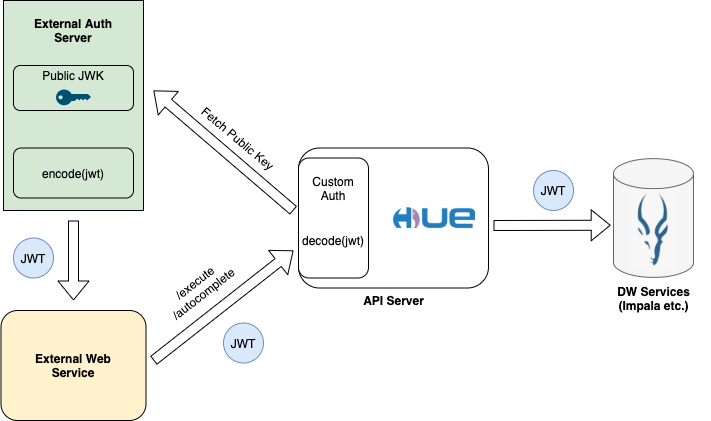Leveraging Hue as an API Service
The Hue SQL Editor allows you to query any Database or Data Warehouse. Initially Hue had private APIs which could be used by the Hue UI only (because they could've changed, auth cookie based, lot of historical parameters etc).
For example, if anyone had set up their own Hue instance, then it was very difficult for any other external services to use the APIs which Hue provides.
Rest API
With the introduction of Public APIs, any external service can see Hue as an API server and use all the end user functionalities under the hood via JWT Authentication.
For authentication, we use djangorestframework-simplejwt to generate a Hue JWT which can be passed as a Bearer token to access the APIs. This is what powers the Hue web components such as SQL Scratchpad!
Custom Authentication
But now let's think of a scenario where an external service or application wants to generate and use their own JWT for authentication? Maybe for easier injection of Scratchpad component into a separate web app? Or the external service wanting to generate their own JWT with their own specifications?
To resolve this issue, we implemented an option of custom JWT authentication (thanks to Django REST Framework custom pluggability)!
Basically if it's enabled, then Hue will accept your JWT in the request headers and let you access the public APIs, provided the signature is valid ;)

- Your web service sends the JWT as bearer token in request headers of the API called.
- Custom auth in Hue first fetches the public key from the auth server and then using it, decodes the JWT to extract the user information.
- To access external services like Impala etc. via Hue, the JWT is further passed on to Impala for it to decode and let your external web service access Impala via Hue seamlessly.
To enable the auth backend, make the following changes in the hue.ini:
[desktop]
[[auth]]
[[[jwt]]]
is_enabled=true
key_server_url=https://ext_authz:8000
issuer=<your_external_app>
audience=hue
Also, if you want to allow Hue to send JWT to external services like Impala etc., enable the following flag in hue.ini:
[desktop]
use_thrift_http_jwt=true
By default, this auth backend only supports the RSA256 algorithm for the JWT signature verification.
But nothing is set in stone! and if you wish to have your own implementation of the custom auth (having customized connection with external auth server or using different signing algorithm etc.), then you can follow the Django REST Framework custom pluggability and add like this dummy auth.
And then, add it in hue.ini (comma separated and in order of priority if multiple auth backends present):
[desktop]
[[auth]]
api_auth=<you_own_custom_auth_backend>
With this flexibility of sending your own JWT to access Hue REST APIs, there is no need to rebuild a client/server for submitting queries, uploading S3 files, collecting more SQL metadata etc. and you get more APIs for free down the road ;)
Any feedback or question is highly welcomed! Feel free to comment here or on the Forum and quick start SQL querying!
Onwards!
Harsh from the Hue Team
